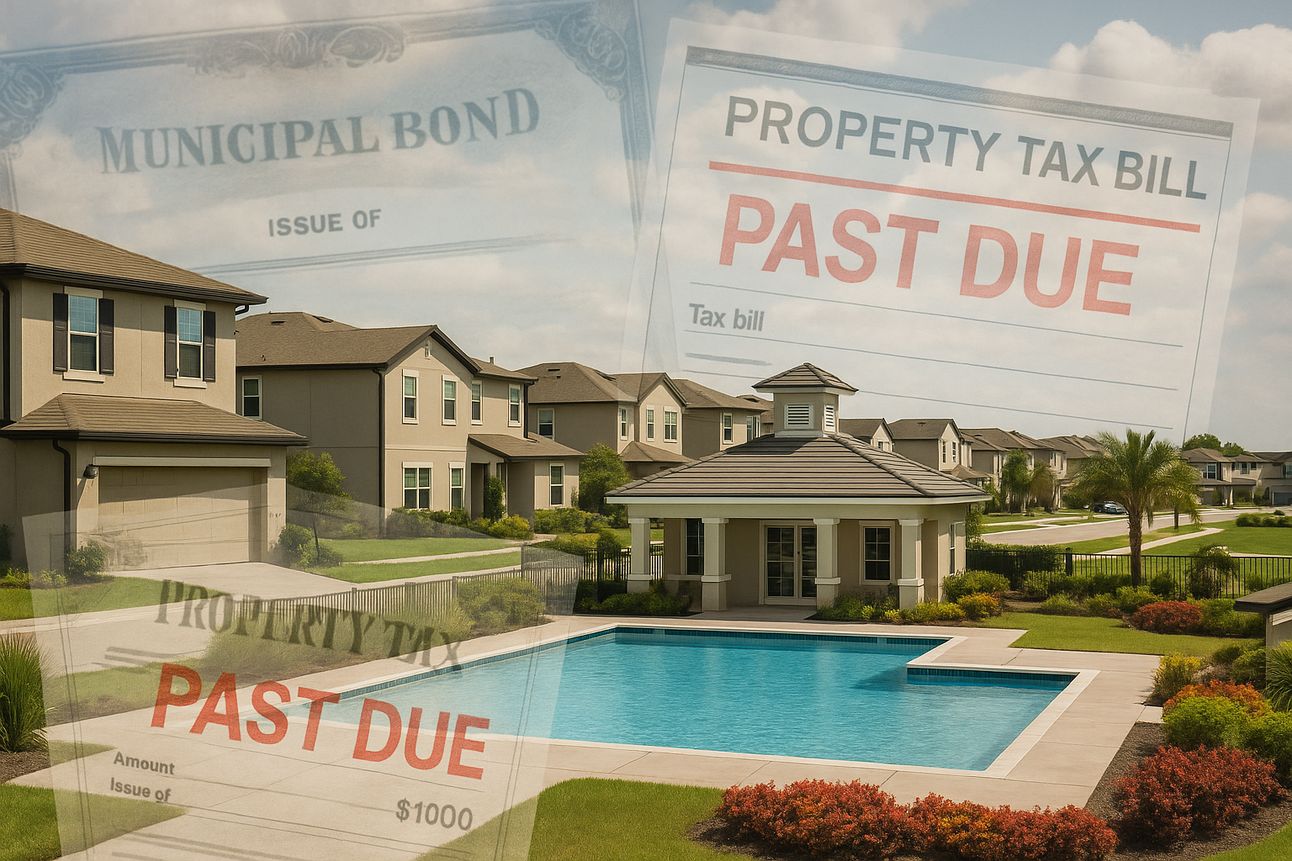Trust This.
By Joseph E. Seagle, Esq.
👋 Happy Friday! Today is National 🍊 Orange Blossom 🌸 Day. Feel free to stop and smell the blossoms.
❗Situation Awareness: Effective October 1, 2025, Senate Bill 948 goes into effect as law. It expands flood-risk disclosure requirements to landlords, condominium developers, and mobile-home park owners. They will be required to inform buyers or tenants about flood damage history or prior insurance claims. Tenants may terminate leases and recover prepaid rent if not properly informed.
1 big thing: Fannie & Freddie at the Crossroads: What Privatization Could Mean for Real Estate Pros

Nearly 17 years after the U.S. government seized control of Fannie Mae and Freddie Mac during the 2008 financial crisis, the prospect of re-privatizing these mortgage giants is once again making headlines. The Trump administration and vocal investors like Bill Ackman are advocating a return to private ownership, possibly through IPOs in 2026 or 2027. But the implications for real estate professionals are complex, potentially reshaping mortgage rates, loan accessibility, and business models across the industry.
Why It Matters: Fannie and Freddie back roughly 70% of the U.S. mortgage market by purchasing home loans, bundling them into securities, and guaranteeing those securities against default. This process stabilizes mortgage access, especially for low- and moderate-income buyers. Any change to their structure reverberates across real estate, lending, investing, and title markets.
Catch Up Quick:
Since 2008, Fannie and Freddie have been in federal conservatorship after receiving a $191 billion taxpayer bailout .
Today, the government owns nearly 80% of their shares, and they’ve returned more than $300 billion to the U.S. Treasury.
Privatization momentum is growing, particularly with FHFA leadership sympathetic to free-market approaches and political winds shifting ahead of 2026 midterm elections.
The Upside for Real Estate Entrepreneurs:
Increased competition could spur innovation in mortgage products such as creative financing options or tech-driven underwriting platforms.
Reduced government interference may allow more agile mortgage strategies, particularly for non-standard borrowers (e.g., self-employed investors).
Investor opportunities through IPOs and broader capital markets could generate new financing channels for real estate professionals.
The Downside:
Higher mortgage rates loom large. Without an implicit government guarantee, mortgage-backed securities would carry more perceived risk, pushing rates upward .
Loan availability could shrink, particularly for 30-year fixed mortgages, which rely on GSE guarantees.
First-time homebuyers and underserved communities may struggle more to qualify, making it harder for realtors and mortgage brokers to close deals in those segments.
Title agents and closers may see disruptions if underwriting standards fluctuate in the short term.
Between the Lines: Trump’s proposal to privatize Fannie and Freddie while retaining an implicit federal guarantee is a paradox. It aims to satisfy both free-market purists and housing advocates, but the risk is it satisfies neither, leaving uncertainty in its wake.
Bottom Line: Whether you’re a Realtor navigating financing hurdles, a mortgage broker quoting rates, or a title professional trying to keep closings on track, the fate of Fannie and Freddie matters. Privatization could mean opportunity, but it may also require a retooling of business models to adapt to a more volatile and unpredictable mortgage landscape.
Next Moves:
Track FHFA updates and Treasury guidance on GSE reform timelines.
Educate your teams and clients on potential mortgage rate volatility over the next 2–3 years.
Diversify lending partners in anticipation of a more fragmented lending environment post-privatization.
Go deeper: Seeking Alpha; Economist; CBS; Harvard Joint Center for Housing Studies
2. 🏘️ Hidden Costs Behind Florida’s Dream Communities

Florida’s booming suburban developments come with a hidden price tag. Real estate developers are increasingly using Community Development Districts (CDDs) to finance roads, sewers, parks and clubhouses. The catch? Buyers, not developers, are left footing the bill for decades, often without realizing it until closing.
Driving the news: A Miami Herald investigation revealed that in counties like Sarasota, Manatee, and DeSoto, homeowners in CDD-governed communities frequently pay more in district fees than in actual property taxes. In some neighborhoods, the fees are nearly five times higher than county taxes .
Some residents in Lakewood Ranch, Waterlefe, and Harrison Ranch pay annual CDD fees topping $4,000 to $6,300 on top of their property taxes and HOA dues.
Since 2020, developers in the region have issued nearly $3 billion in new municipal bonds, passing those repayment costs directly on to homeowners .
The big picture: These bonds fund critical infrastructure during development, but when the bonds are finally paid off, often decades later, the financial burden doesn’t stop. Aging infrastructure like roads and wastewater systems require costly repairs or upgrades, resulting in new fees, special assessments, or even fresh bonds.
What they’re saying:
“It’s almost like the warning label on cigarettes…. They give the least amount of information required by law,” said Chris Jones, economist at the University of South Florida .
Realtors, mortgage brokers, and title agents increasingly bear the responsibility of educating buyers on these hidden obligations.
Between the lines: While higher CDD fees help fund desirable amenities, including golf courses, clubhouses, and trails, they are quietly reshaping affordability. Some economists warn that escalating fees are pricing out working families and younger buyers.
The bottom line: For real estate pros, transparency around CDD fees isn’t optional. It’s essential. Failing to educate clients risks deals falling apart at closing or future legal headaches. Mortgage lenders, title agents, and Realtors alike must be proactive about these disclosures to ensure buyers understand what they are getting into when they sign on the dotted line.
Go deeper: The Miami Herald

This week I sit down on the Trust This: Tips and Tactics podcast with Gonzalo Corzo of Cash Geeks Home Buyers to discuss scaling up and scaling down a real estate operation, and generally being responsive to the market in real time.
3. Catch up fast

Share of flipped properties rose in the first quarter. The Title Report
DeSantis signs 13 bills — most go into effect on July 1. Space Coast Daily
Hurricane season could spell disaster for Florida condos. Newsweek
32 housing markets where tight inventory still favors sellers. Fast Company
Florida’s Citizens Insurance depopulates down to less than 800,000 policies, the lowest number in three years. Newsweek
New Florida laws affect property owners. Here’s what to know. Fox 13
I’m a Florida real estate agent: Here’s 2 reasons my retired clients are leaving the state. Yahoo Life News
Housing market will have “worst year in decades,” analyst says. Yahoo Finance on YouTube
Pinellas County HOA approves $82K special assessment to challenge homeowner over shed and trademark dispute. WFTS ABC Action News
Recurring jobless claims jump to highest since November 2021. Bloomberg
Looking for unbiased, fact-based news? Join 1440 today.
Join over 4 million Americans who start their day with 1440 – your daily digest for unbiased, fact-centric news. From politics to sports, we cover it all by analyzing over 100 sources. Our concise, 5-minute read lands in your inbox each morning at no cost. Experience news without the noise; let 1440 help you make up your own mind. Sign up now and invite your friends and family to be part of the informed.
4. Closing Thought: Why Culture Beats Strategy Every Time

Rufous recommends sticking out your tongue to help you focus on your vision.
The Big Picture: In The Advantage, Patrick Lencioni argues that organizational health, not strategy, finance, or technology, is the ultimate source of competitive advantage. For real estate professionals and entrepreneurs, a healthy culture means less drama, faster decisions, and more sustainable growth.
The Playbook: Lencioni challenges leaders to answer six critical questions to create clarity, drive alignment, and shape culture.
Why do we exist? This is your core purpose beyond profit. For example, are you in real estate to empower generational wealth or to revitalize communities?
How do we behave? Define two to three core values that guide every decision. These aren’t fluff. They should be observable, enforceable behaviors that you, the founder, exhibit from your own core.
What do we do? Get literal. “We acquire, manage, and sell residential and commercial real estate.” Clarity matters.
How will we succeed? This is your strategy. Spell out your differentiators, whether it’s local market expertise, speed, relationships, or client experience.
What is most important, right now? Identify a single, shared priority for the next three to six months. Maybe it’s stabilizing a new property portfolio or launching a private lending division.
Who must do what? Crystal-clear roles and responsibilities eliminate confusion and prevent turf wars.
The Bottom Line: Answering these questions is the foundation for a resilient culture. In real estate, where the market shifts fast, organizational health is the edge that competitors cannot copy.
✅ Your Move: Gather your leadership team. Tackle these six questions together. Alignment is a growth strategy.
We hope you found this helpful — any feedback is appreciated and can be shared by hitting reply or using the feedback feature below.
Was this email forwarded to you? Subscribe here.
Have an idea or issue to share? Email us.
Connect with us using your preferred social media and website links for MyLandTrustee and Aspire Legal Solutions.
Our mailing address: PO Box 547945, Orlando, FL 32854-7945
Our physical address: 1901 West Colonial Drive, First Floor, Orlando, FL 32804
Be on the lookout for our next issue! 👋

